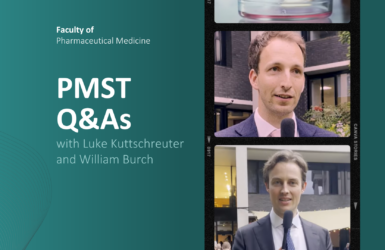Empowering the Future: Reflections of an Educational Supervisor
Posted on: Monday 4 November 2024
Author: Dr Mehrnaz Tadayon FFPM

The role of the Educational Supervisor in pharmaceutical medicine extends far beyond simply supervising trainees. This blog explores how supervisors inspire and guide trainees to become truly knowledgeable professionals. By focusing on leadership development, ethical decision-making, and other key competencies, supervisors help shape the future in healthcare. Whether new or experienced, these reflections highlight how we, as Educational Supervisors, influence our trainees and the broader pharmaceutical medicine community.
Introduction
Being an Educational Supervisor in pharmaceutical medicine is a rewarding experience that extends beyond guiding trainees through the completion of the Pharmaceutical Medicine Specialty Training (PMST) programme. It provides the opportunity to create an environment that fosters the professional growth of trainees, empowering them with the skills, self-confidence, and the support they need to thrive.
As supervisors, we also act like mentors or role models to facilitate the transition of knowledge from the PMST curriculum to real-life application – whether it’s working with regulators, leading complex projects, or guiding practice with patient safety.
In this blog, I want to reflect on the key aspects of being an Educational Supervisor for PMST and why this role is crucial for the future of pharmaceutical medicine.
1. A Comprehensive Approach to Training
The key role of an Educational Supervisor is to support and develop trainees in their progress through the PMST training programme. However, this extends beyond merely monitoring the annual progress, passing exams, and ticking boxes; rather, it is more about recognising and addressing each trainee’s unique qualities and needs as an individual.
Each PMST trainee has different strengths and weaknesses; some are extraordinarily strong technically and need support with leadership, while others are great communicators but require more regulatory understanding. As supervisors, it is our role to tailor guidance to these diverse needs.
It is particularly important to encourage trainees to take time to reflect on their experiences and practice. This reflection not only helps them understand what they have learned but also how to apply that knowledge in practice to make informed decisions in the future. The world of pharmaceutical medicine changes rapidly, and critical thinking includes the ability to adapt – this is a crucial skill; reflective practice helps build this capability.
2. Regulating Effective Communication and Building Trust
Good, open and honest communication is essential for being a successful Educational Supervisor. This does not just involve supervisors giving feedback; it forms the foundation for building a partnership based on respect and therefore trust.
Trainees should not be afraid to put forward their thoughts, raise questions, and even challenge decisions and traditional methodologies. By encouraging openness in dialogue, we actively promote trainees to assume a more active role in their learning and development. This model also provides us, as supervisors, with opportunities for our own growth and the ability to consider issues from new perspectives.
This, in turn, builds an important atmosphere of mutual trust, which is crucial for establishing effective supervision and collaboration. Trainees will feel supported and listened to, enabling them to take responsibility for their learning, seek advice when needed, and develop into confident, independent professionals.

“One of the most satisfying aspects of being a supervisor is witnessing trainees evolve into capable, entrusted, and confident professionals who make meaningful contributions to pharmaceutical medicine.”
3. Development of Leadership and Communicative Competencies
Pharmaceutical physicians must be conversant with science and regulations, possess leadership skills, and communicate complex information in simple terms. Supervisors are crucial for the trainees to achieve such competencies. Leadership in pharmaceutical medicine extends beyond leading teams; it also involves ethical decision-making, driving projects, and encouraging teamwork within matrices. We provide opportunities for trainees to lead projects, gain exposure to different fields, and present their work, all of which instils confidence and prepares them with the necessary skills for leadership positions.
Equally important is communication. Trainees need to be equipped with the ability to simplify and explain different medical information clearly for various audiences, including policymakers, regulators, and patients. Supervisors can support this development by providing feedback on their presentations, reports, and communications with patients.
4. Ethics and Professionalism: The Building Blocks of Supervision
Much of pharmaceutical work involves complex ethical issues. Whether it’s ensuring the protection of participants in clinical trials, navigating interactions with healthcare professionals, or maintaining transparency in drug development, trainees must learn to make ethical decisions.
It is our role as supervisors to model and teach the ethical behaviour expected of them. This means encouraging trainees to thoughtfully consider the consequences of their decisions – not only from an economic or scientific perspective but also from an ethical and professional standpoint. In fact, we assist them in building the judgment they will need in practice by using simulated real-life scenarios that present ethical dilemmas.
Being professional is especially important. We must teach the values of honesty, integrity, and respect towards patients, colleagues, and the public. Upholding these values will help ensure that they remain at the forefront of their professional lives in the years to come.
5. Shaping the Future of Pharmaceutical Medicine
The primary role of an Educational Supervisor involves the well-documented assessment of progress and monitoring of the development of PMST trainees. However, the real value of what we do is so much greater. We are shaping the future of pharmaceutical medicine by training a new generation of leaders, entrepreneurs, and contributors who will advance the specialty in ways we cannot yet imagine.
One of the most satisfying aspects of being a supervisor is witnessing trainees evolve into capable, entrusted, and confident professionals who make meaningful contributions to pharmaceutical medicine. As supervisors, we are not only shaping individuals’ careers but also moulding the future of our profession. By cultivating compassionate, ethical, and accomplished professionals, we secure a bright future for pharmaceutical medicine, with patient care and protection of public health at its heart.
Conclusion
The role of Educational Supervisor is unique, involving the guidance, mentorship, and supporting of trainees. It is our responsibility to guide, assist and to help shape trainees into leaders in their own right.
Through candid discussions, teaching fundamental competencies, and modelling integrity, we prepare our trainees for the challenges and opportunities that lie ahead in their careers. The work we do as supervisors holds great significance; after all, the future of our specialty, and indeed healthcare depends on it. Being an Educational Supervisor means much more than mere supervision – it is about shaping the future.
” As supervisors, we are not only shaping individuals’ careers but also moulding the future of our profession.”
 More about the author
More about the author
Dr Mehrnaz Tadayon is a highly experienced physician, with a solid foundation in Internal Medicine and extensive clinical knowledge. Building on her medical expertise, she transitioned into Pharmaceutical Medicine, completed the PMST training programme and is a Fellow at the Faculty of Pharmaceutical Medicine. Dr Tadayon has over a decade of experience in clinical development and drug safety and has successfully led complex drug development programmes, ensuring the highest levels of patient safety and regulatory compliance.
In addition to her work in clinical and pharmaceutical fields, Dr Tadayon is deeply committed to medical education and mentorship. As an Educational Supervisor for PMST, she supports and guides trainees in achieving their professional goals. She also serves as an ARCP reviewer and PMST examiner at the Faculty of Pharmaceutical Medicine, playing a key role in shaping and assessing the next generation of specialists.
Dr Tadayon is passionate about advancing science and maintaining the utmost standards of quality, ethics, and safety in Pharmaceutical Medicine.


